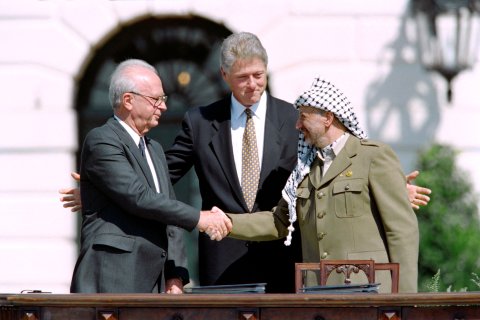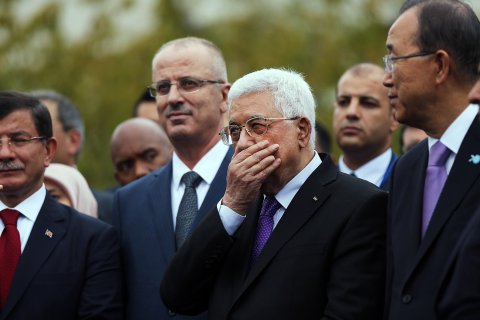TOM O'CONNOR
Just 30 years after the Oslo Accords set the stage for the formation of the first autonomous Palestinian leadership body to be recognized by Israel, the Palestinian National Authority (PA) stands on the brink of collapse, with dwindling territorial control, deteriorating popular support and no clear successor for its aging longtime leader.
And while Israel has also played an influential role in cultivating the conditions that have undermined the West Bank-based government led by 87-year-old President Mahmoud Abbas, deep uncertainties lie over what may come next for the peoples on both sides of a conflict that has commanded international attention for three quarters of a century.
"This is the worst point that I've seen the PA since its creation," Ghaith al-Omari, a former Palestinian National Authority official who previously served as an advisor to its negotiating team and is now a senior fellow at the Washington Institute for Near East Policy, tells Newsweek.
"We often used to talk about the PA collapse as an abstract, a distant threat," he adds. "I think this is now a much more pressing concern. In many ways, we are witnessing the unraveling of the PA."
Should the PA collapse altogether, Omari predicts that, "at least for a couple generations, this will be the end of the Palestinian national movement."
 A
A Palestinian protester yells at an Israeli soldier as he confronts him atop an Israeli army vehicle during a protest against Israeli forces conducting an exercise in a residential area near the Palestinian village of An-Naqura, northwest of Nablus in the occupied West Bank, on September 4, 2019.
With Despair Comes Death
Khaled Elgindy, also a former PA negotiations adviser who today serves as a senior fellow at the Middle East Institute, agrees. With a growing gap between a fading generation of PLO founders and a rising population of disenfranchised Palestinians, Elgindy outlines a "kind of paradox, where everyone's uneasy about succession, but at the same time, the same people who are uneasy about succession are also uneasy about holding an election." Against this backdrop, Palestinians are increasingly losing hope that the PA will deliver upon its founding commitments.
"I think the level of despair that we now have among Palestinians in the occupied territories is a response to this realization that the dream of an independent Palestinian state has evaporated," Elgindy says, "and there's basically nothing left."
Though Israeli opponents to the Palestinian statehood project may be eager to celebrate such an outcome, he warns the accompanying hopelessness breeds even more violent eventualities.
"Imagine the mindset that goes into a 19-year-old who picks up a knife and tries to stab a soldier. We're talking about an act that operationally has zero value in military terms, and that will almost certainly result in his own death," Elgindy says. "And yet it is something that we see increasing, to car ramming, knifing attacks, shooting attacks, someone shoots an Israeli settler, the Israeli response is to level a section of a Palestinian refugee camp."
"Even when people know the consequences, the fact that they still engage in that sort of activity, I think speaks to the level of despair," he adds. "And we should be very, very afraid of despair, because people will do almost anything."
A Tale of Two Peoples
The PA's formation under Palestine Liberation Organization (PLO) guerilla leader Yasser Arafat marked an inflection point for Palestinians, who, for the first time, could envision a peaceful path to independent statehood. Such hopes were soon shattered, however, as violence resurfaced at the turn of the century with the eruption of the Second Intifada, while Arafat's death nearly two decades ago put Abbas in charge not only of the PA and the PLO, but also in control of the secular left-wing Fatah party, which serves as the largest faction within each.
Ever since a violent split with an increasingly popular Hamas in 2006 left the Islamist militant movement in firm control of the Gaza Strip, Abbas has refused to hold legislative elections. This political paralysis, along with mounting Palestinian frustration over controversial Israel-PA security agreements and growing allegations of internal corruption, has fostered a new generation of independent factions taking up arms in defiance of both Israel and the PA.
In parallel, Israel has undergone a reckoning of its own identity. The return of Prime Minister Benjamin Netanyahu to power late last year was only accomplished by forming a coalition with the far-right, who seek to end Palestinian statehood once and for all while supporting expanded Jewish settlements in the West Bank, leaving unanswered questions about how to maintain a Jewish majority while exerting control over a sizable Palestinian population.
Bloodshed is also on the rise. Responding to a severe uptick in Israeli-Palestinian violence over the past two years, the Israel Defense Forces (IDF) has taken to direct raids on the West Bank, especially in the restive Jenin refugee camp, a hub of militant activity effectively outside of the PA's control.
But more subtle concerns have emerged within Israel itself as to what would happen in the event of a PA succession crisis or collapse. These anxieties have given rise to interest in understanding the Palestinian political climate and establishing contingency options.
"I think at the end of the day Israel just has to use this opportunity to advance its interests," Or Yissachar, a former IDF intelligence analyst who serves as research director of the Israel Security and Defense Forum (IDSF), tells Newsweek. "I don't see anyone seriously preparing for that. And when it happens, it's important that we prepare according to our national interests, so that we won't have five minutes to decide."
 US President Bill Clinton (C) stands between PLO leader Yasser Arafat (R) and Israeli Prime Minister Yitzahk Rabin (L) as they shake hands for the first time, on September 13, 1993 at the White House in Washington DC, after signing the historic Israel-PLO Oslo Accords on Palestinian autonomy in the occupied territories.
US President Bill Clinton (C) stands between PLO leader Yasser Arafat (R) and Israeli Prime Minister Yitzahk Rabin (L) as they shake hands for the first time, on September 13, 1993 at the White House in Washington DC, after signing the historic Israel-PLO Oslo Accords on Palestinian autonomy in the occupied territories.Quantifying the Crisis
Yissachar has helped lead a data-driven project outlining Palestinian public opinion when it comes to leadership and other issues. The study, shared exclusively before publication with Newsweek, cited Palestinian polls showing some 80 percent of respondents are dissatisfied with Abbas and want him to resign. Meanwhile, Hamas and its leader, Ismail Haniyeh, outperform Fatah and Abbas in nearly every metric, including preferred candidate in elections and rightful representative of Palestinians.
The study also offered a comprehensive review of Palestinian social media trends, revealing that Hamas enjoys significant advantages in support over Fatah on Telegram, TikTok and other platforms.
Though Hamas has not made any overt attempts to wrest power from the PA in recent years, such a scenario looms large in Israel's policy planning. Yissachar says a Hamas power play would result in "IDF intervention" and "it's not something that Israel wants at all." Even with roughly 10,000 personnel in the IDF's Judeah and Samaria Division tasked with overseeing the West Bank, Yissachar warns that Israel does not have "enough manpower to handle all of this."
At the same time, there are alternative Israeli plans emerging, and he says "one of the more interesting ways out of it are those local factions" of traditional Palestinian tribal and clan-based leadership that continue to exert influence within cities and villages in territories nominally under PA control.
The idea of reverting to local Palestinian rule is not new. As Omari and Elgindy note, it's a concept that has existed since at least the 1970s in the form of the so-called "village leagues" movement. Serious doubts persist as to whether such a system would prove sufficient in addressing the threat of instability that would follow the PA's demise.
Both former PA advisers were also skeptical that there was any true consensus in Israel as to how to respond if Abbas was no longer in the picture. The Israeli public appears to lack confidence too, as the IDSF study showed some 52 percent of Israeli respondents believed Israel was not prepared for the day after Abbas, and another 28 percent did not know if their government was ready.
The Day After Abbas
Elgindy also describes a "very unclear picture" on the Palestinian side of the equation. While some potential successors to Abbas have emerged, such as PLO Executive Committee Secretary General Hussein al-Sheikh, Elgindy says he is "not convinced" that Sheikh "has a critical mass of support within Fatah, much less outside of Fatah within other factions—never mind Hamas—which would allow him to easily assume control."
Menachem Klein, a former adviser to Israeli negotiators and currently a senior lecturer at Bar Ilan University, said an effort to install known Palestinian figures such as Sheikh or PA spy chief Majed Faraj would be Israel's immediate preferred response to a PA collapse. He argues, however, that such a plan would face not only Palestinian resistance, but also challenges from ultranationalist Israeli factions, such as that led by Finance Minister Bezalel Smotrich, potentially leading to military intervention and attempts to install local rule.
"If the Palestinian public resists and force does not help, or Smotrich and company's side win the power struggle, reoccupation of the West Bank and interim military government are the way to rule the area," Klein tells Newsweek. "When quiet is restored, district or regional councils based on unconnected autonomous municipalities can replace the military government. "
But he warns that "this order will further establish the separate and unequal Jewish regime."
He argues that, already, Israel has "de-facto annexed the West Bank" and "the PA is not a Palestinian state in the making or in waiting as the Oslo Accords established it." Rather, according to Klein, "de-facto there is one Israeli-Jewish supremacy regime between Jordan and the Mediterranean," in which "the Jewish minority or small still-majority divides the Palestinians to Israeli citizens, East Jerusalem residents, West Bankers, Gaza Strip subjects" and "Palestinian diaspora," to each of whom "Israel allocates distinct sets of human and civil rights and denies others."
Meanwhile, Klein asserts that the PA's international legitimacy has only further sunk in the wake of Abbas' speech at a recent Fatah meeting in which the Palestinian leader appeared to deny the antisemitic nature of the Holocaust. In his comments, Abbas declared that Nazi Germany slaughtered Jews "because of their social role and not their religion." The European Union, France, Germany and the United States are among those who have come forward to blast the Palestinian leader's remarks as ahistorical and hateful.
Palestinian leadership continues to stand by its leader and his speech, which also acknowledged the persecution of Jews in Arab countries after Israel's foundation and promoted a two-state solution to the Israeli-Palestinian conflict. PLO Executive Committee member Faisal Aranki rejects the deluge of criticism over Abbas' words, arguing that the point was to express grievances about current realities.
"Abbas was trying to explain the effect of Israel's brutality and its settler-colonial regime. I am sure that his narrative did not legitimize or normalize any violence against Jews," Aranki tells Newsweek. "His narration staged the Palestinian ordeal, refused to avoid the unending suffering, and utilized his intervention to open up an opportunity for more productive dialogue against state racism, and hate crime."
Even if Abbas' comments regarding the Holocaust may find a receptive audience among more radical Palestinian factions, including Hamas and Islamic Jihad, few expect any major reconciliation down the road. Fatah and Hamas have continually sought to overcome their differences, including at an Islamic Jihad-boycotted summit held late August in Egypt, but little action has been shown by either side in making the necessary concessions toward joint rule.

Palestinian leader Mahmoud Abbas pauses moments before the Palestinian flag is raised for the first time at the United Nations headquarters on September 30, 2015 in New York City. Following remarks by Palestinian President Abbas, the flag was raised in the rose garden at 1:00pm local time in front of a large crowd of diplomats, reporters and Palestinian supporters.
Mutually Assured Destruction
Lacking unity, strong governance and any semblance of a path toward renewed peace talks, Palestinians find themselves at risk of ultimately losing their dream of statehood, going the route of countless other disaffected ethnic groups such as Balochis, Basques and Kurds, all of whom have failed to gain independence through decades of diplomacy and armed struggle. As Omari says, history "is full of national movements—which are equally deserving of statehood as the Palestinians—who never got their act together."
And yet the coming crisis brings with it a severe existential threat to Israel as well.
"The idea that a collapse of the Palestinian Authority would converge with the annexation aspirations of the hard-liners on the right is so stupid and so short-sighted," Gilead Sher, a former senior Israeli peace negotiator who today serves as a fellow at Rice University's Baker Institute, tells Newsweek.
Sher argues that the very idea of establishing a Jewish democracy based on the concept of Eretz Israel, a Hebrew term describing the promised "Land of Israel" that appears in religious texts, is incompatible with direct rule over Palestinians, whose participation would preclude the Jewishness of the Israeli state. He warns that, "if Israeli politics are not halted by democracies and the expansionist trends of the current government are not stopped by, first and foremost, America, then we are doomed to put an end altogether to the Zionist enterprise of having a Jewish democracy in parts of Eretz Israel."
"We have 15 million people, half Jews and half non-Jews, [including] Palestinians in the Gaza Strip and the West Bank and Israeli Arabs, who are Israeli citizens, of course," he adds. "Altogether, it's almost an identical number, an equal number of Jews and non-Jews. You cannot hold a democracy with such a minority that is half of your population, and you cannot maintain a Jewish majority in such a paradigm."
No comments:
Post a Comment